You are here: GSI Wiki>TOS/BunchBucket Web>BunchBucketDocumentation>BunchBucketDocuments>BunchBucketTestsMeasurements>BunchBucketTestMeasurement10 (2022-07-19, dbeck)Edit Attach
June 2022: Bunch-to-Bucket SIS18 -> ESR V2
Table of ContentsIntroduction
A machine experiment is performed on 29 June. The experiment has two aims. First, bunch-2-bucket transfer should be tested for h=1 (SIS18) to h=1 (ESR). Second, accumulation with multiple injection from SIS18 in ESR should be tried - 'stacking'. UNILAC delivers a beam of 208Pb65+ @ 8.6 Mev/u which is accelerated to 275.0 MeV/u with SIS18. SIS18 is operated at 1st harmonics (h=1), thus the full beam is extracted in one single bunch. On its transfer to ESR the bunch passes a stripper foil to further strip the ions to naked 208Pb82+; this is associated with some energy loss down to 268.0 Mev/u. The bunch is then injected into ESR, that is operated at 1st harmonics (h=1). Thus, the settings are well suited for a machine experiment with the bunch-2-bucket transfer setting.Setup
See here. B2B firmware and software v00.03.18, branch b2b_dietrich_2021-oct-14, commit 83eab29Settings
- SIS18
- h=1
- revolution time 1.137 us
- ESR
- h=1
- revolution time 0.571 us
- ca. 3e7 injected particles per bunch
- b2b
- 'beating period'
116 us; this short period is due to the energy loss in the stripper foil - 'fine tune'
yes; FT improves extraction precision by checking neighboring rf-cycles around the theoretical beating time: Typically the beating time does not exactly coincide with an rf-cycle; thus one has to calculate which of the neighboring cycles fits better) - 'multi-beat tune'
yes; MBT is a technique improves phase matching in case of very short beating time: Matching is calculated for a couple of beating periods (1, 2, 3, ...), the results are compared and the best match is chosen.
- 'beating period'
Data Acquisition
All diagnostic data of the b2b system has been recorded internally. Diagnostic of the beam has been done using theFCT Ring system that has been developed by the beam instrumentation group (credits to A. Reiter, O. Chorniy, H. Bräuning). In the beginning FCT GE02DT1FP has been selected as signal source. However, the beam intensity was reduced in during the experiment and the FCT system was modified to use a BPM as signal source.
Log
- 11:57:27, injection as coasting beam
- 12:06:46, injection mode bunch-2-bucket
- 12:15:31, change FCT_RING System to a BPM (FCT does not give sufficiently strong signal)
- 12:16:37 - 12:36:48, 'entropy scan' of phase difference, range is 568 ns in 10 degree steps
- 12:35:09, delta phi 157 ns, this looks ok
- 12:36:15, delta phi 126 ns, this looks not as good
- 12:36:48, delta phi 221 ns, this looks not as good
- 12:37:39 - 12:43:42, scan range 126-173 ns in 4 degree steps
- 12:44:31 - 12:58:19, scan range 135-157 ns in 1 degree steps
- 13:00:00, best phase is 429 ns
- 13:10:00, experiment with stacking, about a factor of three can be achieved
- 13:49:00, more stacking with reduced beam intensity, about a factor of 10 can be achieved
- 15:00:00, end of machine experiment
Results
Bunch-to-Bucket Transfer SIS18 -> ESR
A series of transfers has been done, where the phase difference between the h=1 DDS systems of SIS18 and ESR was changed between transfers.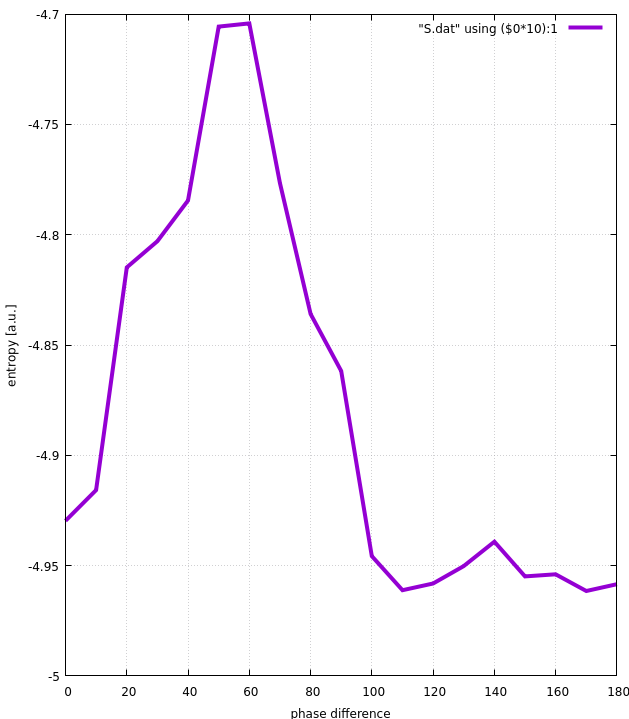 Figure: Entropy (y-axis [a.u.]) as a function of phase difference (x-axis, [°]). The phase difference is in units of the SIS18 h=1 frequency.
The figure above shows the measured entropy as a function of phase difference. The entropy peaks around 55° and has a FWHM ob about 50° (in units of SIS18 h=1) Thus, the distribution is quite broad. The idea behind 'entropy scans' is described here.
During this measurement, it was observed that the injected beam always kept 'oscillating' in the longitudinal direction.
Figure: Entropy (y-axis [a.u.]) as a function of phase difference (x-axis, [°]). The phase difference is in units of the SIS18 h=1 frequency.
The figure above shows the measured entropy as a function of phase difference. The entropy peaks around 55° and has a FWHM ob about 50° (in units of SIS18 h=1) Thus, the distribution is quite broad. The idea behind 'entropy scans' is described here.
During this measurement, it was observed that the injected beam always kept 'oscillating' in the longitudinal direction.
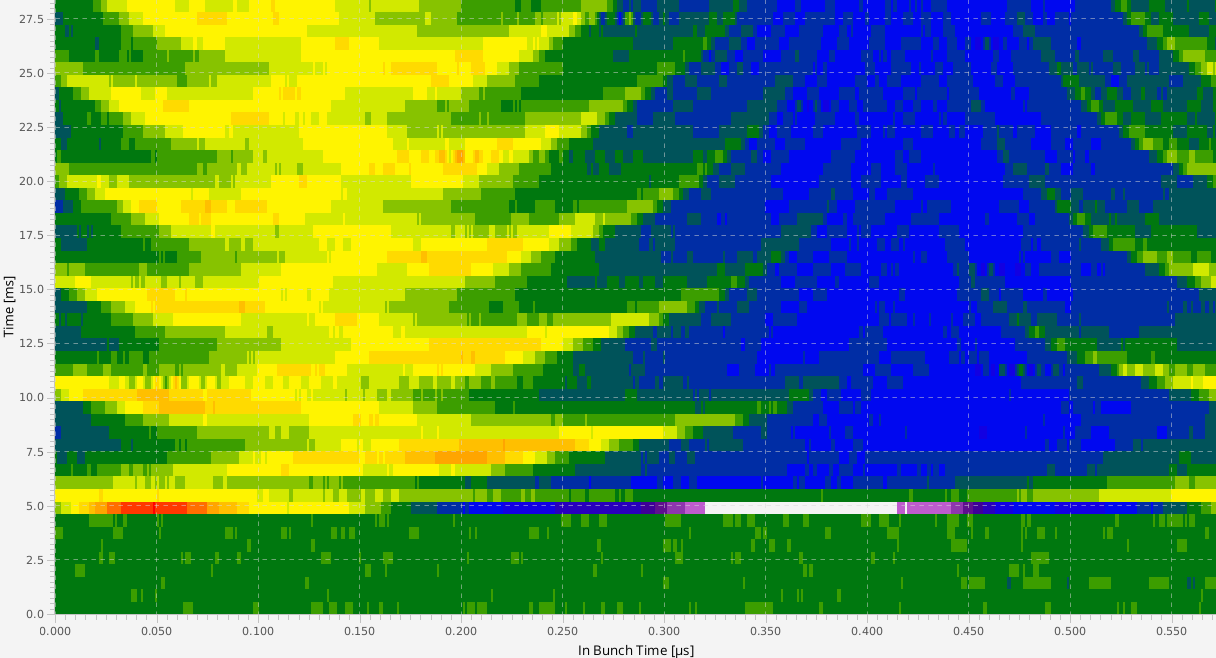
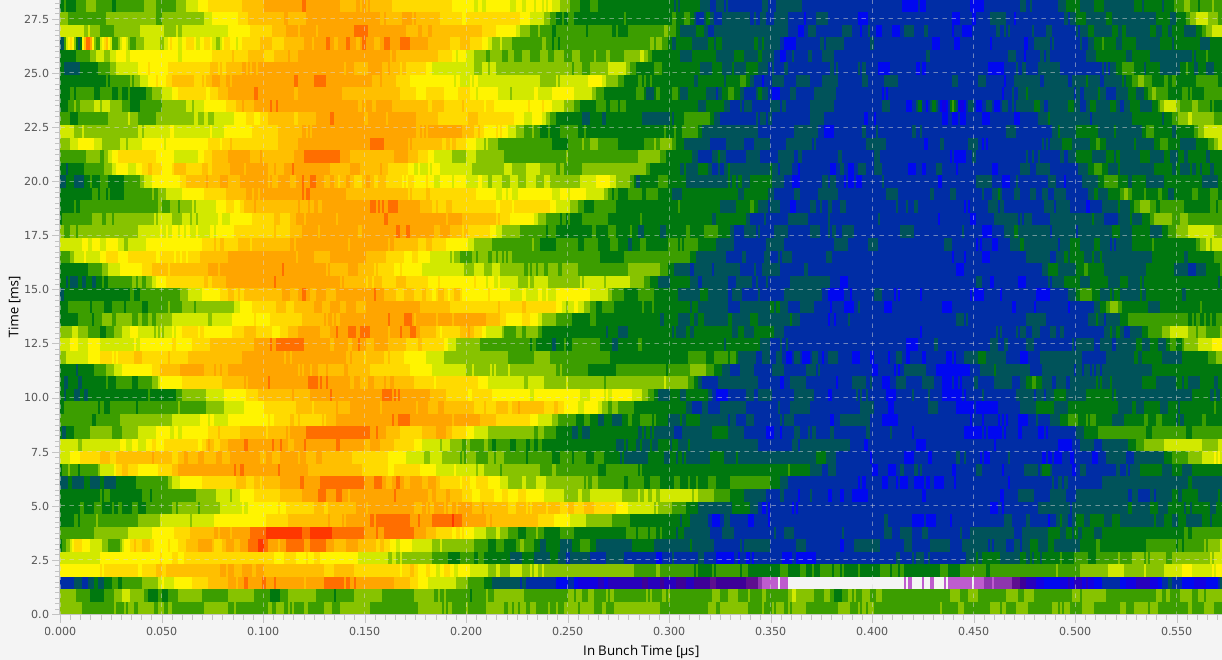 Figure: Shown is the position of the bunch in the ring (x-axis) and its development with time up to 30 ms (y-axis). Top: Optimum phase 189ns (60°) according to 'entropy measurement'. Top: Most narrow distribution by try-and-error at phase 145 ns (46°).
It was not possible to get rid of this oscillation by tuning the phase difference of the h=1 DDS systems in SIS18 and ESR although rf and DDS frequencies were perfectly matched.
Figure: Shown is the position of the bunch in the ring (x-axis) and its development with time up to 30 ms (y-axis). Top: Optimum phase 189ns (60°) according to 'entropy measurement'. Top: Most narrow distribution by try-and-error at phase 145 ns (46°).
It was not possible to get rid of this oscillation by tuning the phase difference of the h=1 DDS systems in SIS18 and ESR although rf and DDS frequencies were perfectly matched.
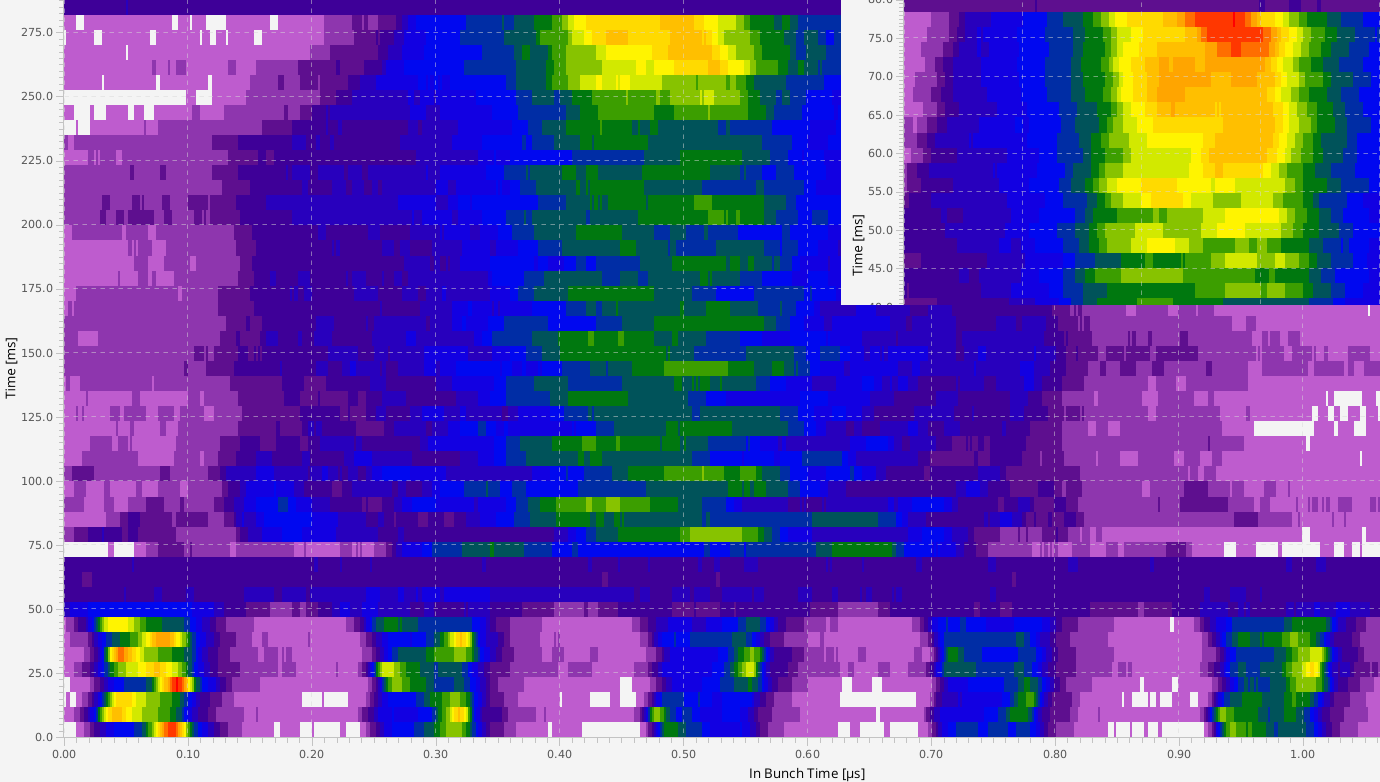 Figure: Beam in SIS18 prior extraction. From bottom to top: Operation at h=5, debunching, and rebunching to h=1. The inset on the upper right shows a zoom-in of the last 40 ms prior extraction.
The figure above shows the bunch(es) in SIS18 prior extraction. There seems to be a longitudinal oscillations in SIS18 prior extraction. There is some speculation, that the time for rebunching from h=5 to h=1 might have been insufficient.
At this point it would have been best to get rid of the oscillations in SIS18 and then tune the transfer and injection into ESR again. However, this was considered not an option as the time left for experiments was very limited. Thus it was decided that the best setting for bunch-2-bucket transfer was at a phase difference of 145 ns (46°).
Figure: Beam in SIS18 prior extraction. From bottom to top: Operation at h=5, debunching, and rebunching to h=1. The inset on the upper right shows a zoom-in of the last 40 ms prior extraction.
The figure above shows the bunch(es) in SIS18 prior extraction. There seems to be a longitudinal oscillations in SIS18 prior extraction. There is some speculation, that the time for rebunching from h=5 to h=1 might have been insufficient.
At this point it would have been best to get rid of the oscillations in SIS18 and then tune the transfer and injection into ESR again. However, this was considered not an option as the time left for experiments was very limited. Thus it was decided that the best setting for bunch-2-bucket transfer was at a phase difference of 145 ns (46°).
Stacking
This is considered to be the most interesting part of the machine experiment: Accumulation of multiple injections from SIS18 in ESR. The method applied here is also called 'injection at the unstable fixpoint'. Basically, injection is done phase locked. However, the injection is not done into the center of the bucket but with a phase difference that corresponds to 180° with respect to ESR h=1 - this could be described as bunch-2-gap. Due to the large acceptance of ESR, the injected bunch remains stored. Then the electron cooler is used to cool the bunch into the center of the rf-bucket. Then, the next injection is done into the gap. If the length of the kicker flat-top is sufficiently short (about half of the revolution time in ESR) the previously injected bunches in the rf-bucket are not affected by the kicker and remain stored. In principle, this old technique allows to accumulate any number of desired injections.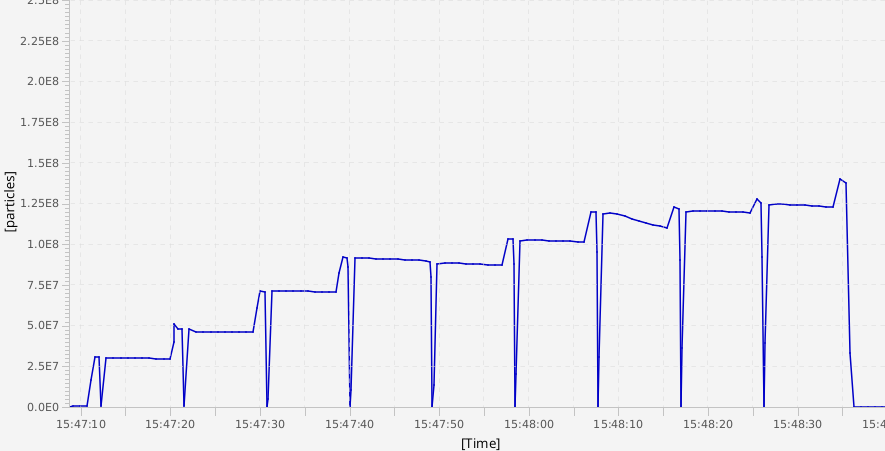
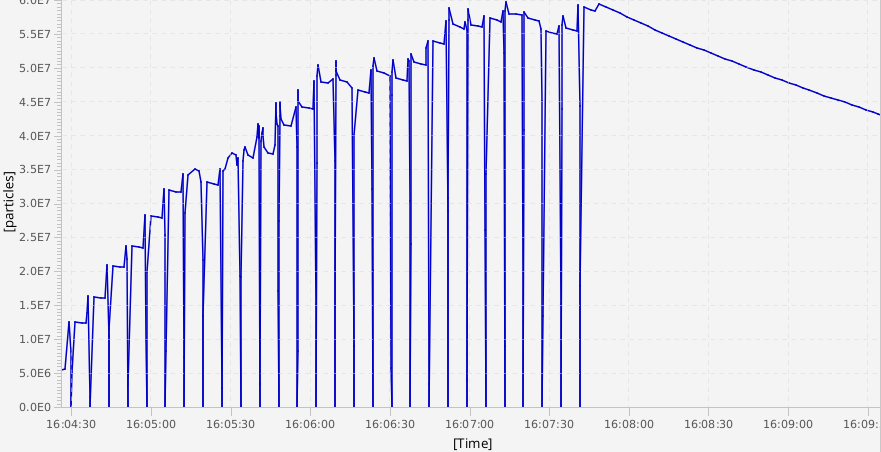 Figure: Stacking of bunches in ESR. Top: Injections with bunches at full intensity. Bottom: Intensity per bunch reduced by decreasing the chopper window.
The two figures above show successful stacking of beam in ESR as observed by the Lassie system provided by colleagues from beam instrumentation. However, saturation is achieved already after a few injections when beam at full intensity is used. It is suspected, that space charge in ESR is the limiting factor here. Thus, the intensity of beam from SIS18 was reduced by decreasing the chopper time. As shown in the figure of the bottom, this improves the stacking efficiency considerably.
Figure: Stacking of bunches in ESR. Top: Injections with bunches at full intensity. Bottom: Intensity per bunch reduced by decreasing the chopper window.
The two figures above show successful stacking of beam in ESR as observed by the Lassie system provided by colleagues from beam instrumentation. However, saturation is achieved already after a few injections when beam at full intensity is used. It is suspected, that space charge in ESR is the limiting factor here. Thus, the intensity of beam from SIS18 was reduced by decreasing the chopper time. As shown in the figure of the bottom, this improves the stacking efficiency considerably.
Summary
True bunch-2-bucket transfer has been done from SIS18 to ESR using the 'frequency beating' method. A best phase difference between the two h=1 group DDSs has been determined. However, the bunch signal on the FCT did not look perfect. Maybe the reason was a non-adiabatic process for rebunching from h=5 to h=1 in SIS18. With the achieved settings, it was tried to stack multiple bunches in ESR. After reducing the beam intensity from SIS18 by reducing the chopper window, it was possible to achieve stacking of SIS18 beam in ESR by about a factor of 10. -- DietrichBeck - 19 Jul 2022| I | Attachment | Action | Size | Date | Who | Comment |
|---|---|---|---|---|---|---|
| |
2022-06-29_12-00-00_esr-inj_entropy-scan.png | manage | 38 K | 2022-07-13 - 16:00 | UnknownUser | entropy scan |
| |
2022-06-29_12-22-11_esr-inj_phase189ns.png | manage | 44 K | 2022-07-13 - 16:12 | UnknownUser | longitudinal oscillation at phase 189ns, 60 degree, close to optimum |
| |
2022-06-29_12-55-34_esr-inj_phase145ns.png | manage | 50 K | 2022-07-13 - 16:21 | UnknownUser | longitudinal oscillation at phase 145ns, 56 degree, close to optimum, looks better concentrated |
| |
2022-06-29_14-33-04_sis18-ext-v0.png | manage | 66 K | 2022-07-13 - 16:32 | UnknownUser | extraction from SIS18 |
| |
2022-06-29_15-48-40_esr-inj_stacking1.png | manage | 37 K | 2022-07-13 - 17:08 | UnknownUser | stacking v1 |
| |
2022-06-29_16-09-34_esr-inj_stacking2.png | manage | 66 K | 2022-07-13 - 17:08 | UnknownUser | stacking v2 |
Edit | Attach | Print version | History: r3 < r2 < r1 | Backlinks | View wiki text | Edit wiki text | More topic actions
Topic revision: r3 - 2022-07-19, dbeck
 Copyright © by the contributing authors. All material on this collaboration platform is the property of the contributing authors.
Copyright © by the contributing authors. All material on this collaboration platform is the property of the contributing authors. Ideas, requests, problems regarding GSI Wiki? Send feedback | Legal notice | Privacy Policy (german)


